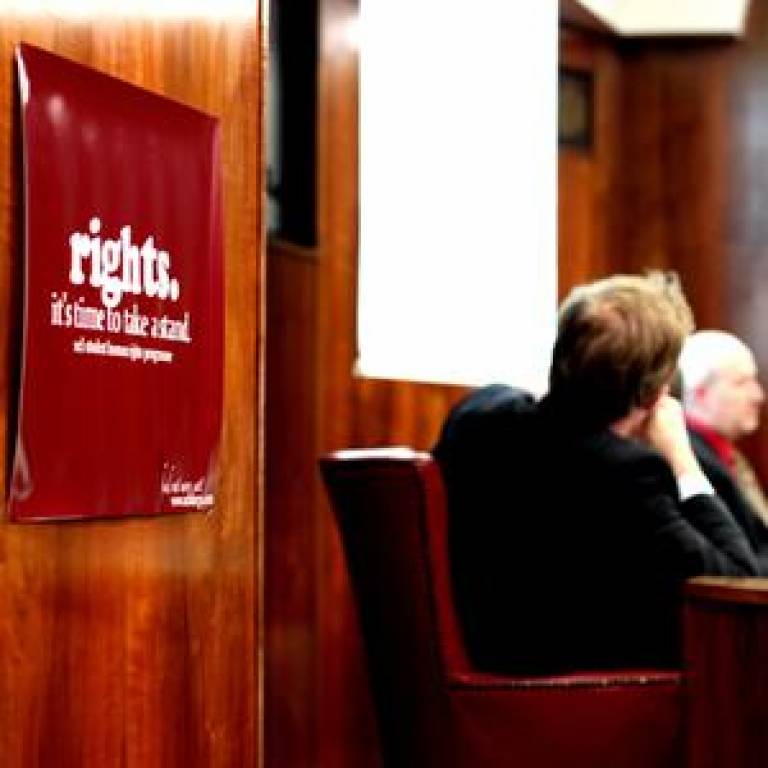Internet and e-rights: A modern challenge for the legal world
26 October 2010
"Human rights such as the right to private life, freedom of expression and information and intellectual property rights need to be reviewed and reinterpreted in the light of the evolution of internet applications.

"
Napoleon Xanthoulis, Vice-President of the UCL Student Human Rights Programme (UCLSHRP) welcomed with these words those attending 'Internet & E-Rights: Challenges and Perspectives', the 2010 Round Table Discussion organised by the UCLSHRP which took place on 20 October at UCL Laws.
Below he outlines the major issues raised through the ongoing evolution of internet applications as discussed at the round table - and which will form the subjects of legal disputes at national and international levels in the future.
"A draft list of 10 core 'e-rights' was presented by Andrew Murray, Reader in Law at London School of Economics (LSE). He argued that 'with so much of our lives reliant on online access - banking, communications, social networking, relaxation, content delivery etc. do we need more than just a right to access? Is it now time for a Cyberspace Bill of Rights?'
The ongoing problem of 'net neutrality' was analysed in detail by Dr Daithí Mac Síthigh, Lecturer at the University of East Anglia. He warned that 'the ability of internet service providers to manage, restrict or prioritise the data transferred within these services raise not only issues regarding competition law and consumer protection, but also the basic right of access to the internet. We live in an era in which we spend an enormous amount of time in the virtual sphere, therefore, it is important to make sure that protection of the relevant human rights is guaranteed'.
The European Union Law framework regarding protection of private data in social networking activity was described by Stratis Camatsos, Member of New York Bar and Solicitor of England and Wales who practises in Brussels in Pappas and Associates law firm. He stated that 'the new trend is to centre a large number of personalised internet applications (Facebook, e-mail, Skype, online banking, etc.) in a telephone device. This would mean that if your mobile phone gets stolen by the right people your most sensitive private data will be public with unpredictable consequences'.
Emily B. Laidlaw, PhD Candidate at the department of Law at LSE, addressed the challenging legal issues raised by search engines and presented the milestone Google cases. 'Search engines don't fit into any traditional categories; in media terms they are not quite newspapers or broadcasters' and added, 'in crafting where to go in regulatory terms the question is how search engines affect the public interest and human rights'.
'I do wonder whether, when he made his famous declaration of independence for cyberspace in 1996 railing against regulatory intervention online, John Perry Barlow could have ever imagined we'd be gathered here today 15 years later debating the need for regulation to protect fundamental rights online,' summed up Ben Allgrove, the panel's chairman, Partner at Baker & McKenzie LLP and leading professional in intellectual property and freedom of information law.
The audience consisted mainly of undergraduate and postgraduate students in a variety of disciplines, including Law, Political Science, Human Rights and Information Technology, as well as professionals. Following the presentations, they were offered the opportunity to address further questions and deepen the discussion."
Image by Napoleon Xanthoulis
UCL context
The UCL Student Human Rights Programme is a dynamic and pro-active human rights organisation, affiliated to the UCL Institute of Human Rights. It is led by students and advised by human rights academics and professionals, with members from all walks of life. Because our human rights are worth protecting, the program seeks to foster a vibrant culture of human rights within UCL and wider communities by initiating awareness, instigating debate and inspiring action.
 Close
Close

